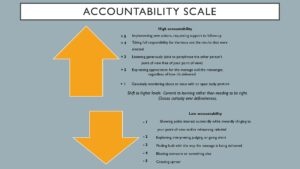Accountability: A Necessary Step Before Unity
 By Nicole Taylor
By Nicole Taylor
Two weeks ago, a mob of Trump supporters stormed the Capitol building to interrupt the certification of the 2020 election. They harmed and in some cases caused the death of Capitol police officers, they vandalized and stole property, and verbalized a desire to harm lawmakers that they did not agree with.
Hours later, members of the political party this mob is associated with made calls for unity, skipping over the step of acknowledging and contending with the gravity of the situation.
What feels clear to me is that there is no unity without accountability. Authentic unity cannot happen without taking responsibility. Calls for unity are trying to skip over a key part of healing from the trauma of this insurrection, which is to face into what happened on January 6th and acknowledge it. That leads to accountability. That is taking 100 percent responsibility and it is necessary if this country is to choose to move forward rather than just pushing a festering wound underground.
As I thought about what accountability might look like, I remembered the Accountability Scale, created by Katie and Gay Hendricks. It’s a tool that I use in moments where I need to investigate how well I am demonstrating healthy accountability or whether it’s time to make a shift.
The Accountability Scale is easily applied to determine if you’re in high or low accountability. Once you know where you are, you can make a shift toward a higher level of accountability by committing to learning (rather than telling yourself that you’re right). That shift also can come from approaching a situation with curiosity and wonder rather than defensiveness.
The magic of accountability is that it can help those who use it to get unstuck, choose how to move forward, and cultivate genuine unity. At first, we need to acknowledge if we are open to seeing things differently and to understanding our current level of responsibility. Once we see where we are, it creates an opening for a path forward.
Here’s what low accountability looks like, with -5 being the lowest level of accountability (and examples targeting this specific incident)
– 1 Showing polite interest outwardly while inwardly clinging to your point of view and/or rehearsing rebuttal
- For example, mentally planning your rebuttal rather than listening to other perspectives.
– 2 Explaining, interpreting, judging, or going silent
- For example, explaining all the reasons why your actions were justified.
– 3 Finding fault with the way the message is being delivered
- For example, saying something like, “The media is blowing this out of proportion.”
– 4 Blaming someone or something else
- For example, demanding evidence to support another person’s perspective in a hostile manner, or saying something like “It was Antifa.”
– 5 Creating uproar
- For example, attacking people you disagree with, verbally or otherwise, or continuing to participate in or support (via your social media) uprisings.
If we find ourselves in one of the states above, we can choose to shift. We create a shift by bringing in curiosity, not defensiveness, and by being willing to learn, rather than be entrenched in our POV. Here’s what high accountability might look like (with +5 being the highest level of accountability):
+ 1 Genuinely wondering about an issue with an open body posture
- For example, getting curious about other perspectives of the events of January 6th.
+ 2 Expressing appreciation for the message and the messenger, regardless of how it’s delivered
- For example, deeply listening to the perspective of those who were harmed by the event and letting them know their perspective has had an impact on you.
+ 3 Listening generously (able to paraphrase the other person’s point of view free of your point of view)
- For example, confirming that you understood another perspective, perhaps with “I hear you saying ____.”
+ 4 Taking full responsibility for the issue and the results that were created
- For example, “I did not participate in this event but I did participate in rhetoric that led to it. That caused real harm and I take full responsibility for that. I am working to understand what led me to engage in that rhetoric. And I am working to understand what I can do to help repair how I engage with my community and with democracy.
+ 5 Implementing new actions, requesting support to follow-up
- For example, leaving the groups you’re in that supported the insurrection. Seeking support from a professional.
Making the shift
I recognize that for most of the people that were there, this article would not apply because they stand by their actions. The people wearing Nazi sweatshirts, for example, are likely not reading this article and likely feel no remorse for their actions.
But I have to believe there are people who, after the fact, recognize that their involvement was not their best thinking. And for those folks, perhaps some of these ideas are a way for you to move forward. Maybe by moving up the accountability scale you can repair relationships and do your part to contribute to true unity.
This tool can help all of us over the next weeks and years as we try to actually hear one another and find common ground where possible.
Accountability allows us to engage in a shared reality, which is necessary for any real form of healing or unity when there’s division. The shift from lower levels of accountability to higher levels of accountability can happen when we commit to learning from our experiences rather than needing to be right and when we choose curiosity over defensiveness.
I think this tool can be helpful as we do the work of choosing how we want to move forward, together.
Nicole Taylor (ajoyfulpause.com) is dedicated to supporting individuals in their personal transformation. Using a blend of meditation, yoga, Conscious Living tools, and Ayurvedic principles, Nicole facilitates transformative offerings on self-care. Nicole is a 500-hour certified yoga teacher, and a graduate of the Hendricks Institute’s Big Leap Coach program and Leadership and Transformation program.



